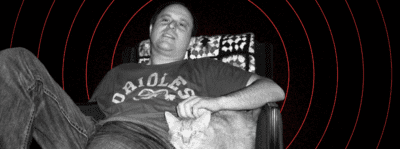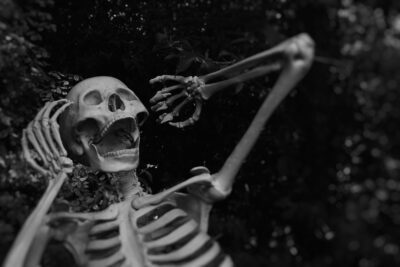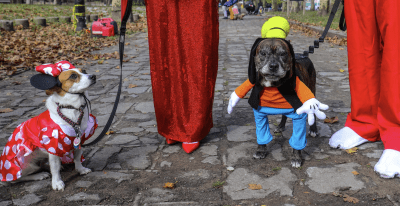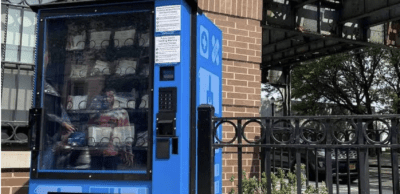Courtesy Rhonda
Why L.A. club kids Rhonda are bringing James Blake to New York
The long-running, pansexual Los Angeles underground party is paying homage to their East Coast influences at Musica this Friday
Rhonda, the outrageous house and disco party series, has become a phenomenon in Los Angeles, having been incubated in semi-legal underground venues and made its way to an internationally-touring phenomenon. Co-founders Gregory Alexander and Loren Granich say they owe it all to inspiration from the classic late ‘70s era of New York nightlife that birthed house music. Brooklyn actually owns a rarely acknowledged slice of this familiar New York club story: Paradise Garage was famously fronted by Flatbush’s Larry Levan, and the sound of disco metamorphosed not only at famous clubs like Paradise Garage and Studio 54, but also local venues like Bay Ridge’s 2001 Odyssey and the Brown Derby.
On Friday night, Rhonda is bringing CMYK, their new party created in collaboration with London musician James Blake, to New York for the first time. Brooklyn Magazine caught up with Alexander and Granich to discuss the new party, which will go down at Musica in Midtown, meeting up with Blake by chance in Antigua, and Rhonda’s return to New York for the first time since the pandemic.
This conversation has been edited for flow and concision.
Explain Rhonda to people in New York who may not have heard of it.
Gregory Alexander: Rhonda is a nightlife deity. A demigoddess is how I like to see her: of partying, of dance music, of self-expression. Rhonda started in Los Angeles back in 2008 with the tagline of “house, disco and polysexual hard partying.” Since then, that tagline has evolved, most recently to “passion, pleasure and possibility,” which is an evolution to what we felt we provided for our community as well as what we expected them to provide for us in return.
Loren Granich: Rhonda is a pansexual club community dedicating itself to the nightlife arts. Hopefully that’s cool. It changes every time. I would say most of our DNA comes from New York, even though we’re not from New York. We get our core influences from people like Larry Levan or David Mancuso, New York nightlife started club culture around the world, so it’s always a pleasure to come back to New York and be welcomed in a place that we revere so highly.
I was listening to your interview on the RA podcast, you said you don’t want a Rhonda party to be a club night that someone goes to and forgets.
GA: Yeah, it’s meant to be transformative. Nightlife has always been partly an escape from the real world, and a bit of a fantasy. A place that you can meld that with what your idealized reality is and something that we aim to provide for people is that we don’t want for it to just be another drop in the bucket. We want it to be something that you always hold dear, and that you remember, and some story that you can tell other people throughout the week and hopefully the years.
What can partygoers expect on Friday night?
GA: James Blake fits that bill. His music is really emotive and transformative in its own way. He’s a really intelligent, well-versed person in all different types of music. Hearing a DJ set from James is its own type of education, and its own type of experience all together.
LG: James has found a lot of success with his beautiful music, but at the same time James was cut from the cloth of the UK underground. He was growing up going to a lot of raves and being shaped by the UK underground sound. So, he wants to stretch out and get back to those underground roots and spend time in a nightclub playing music from the underground.
How did you get James Blake involved?
GA: Right out of the pandemic, as soon as restrictions lifted our first event was a traveling event in Antigua. We took a bunch of people and did a resort takeover there, with a DJ set up at every possible outlet: the multiple pools, the penthouse, on a boat, on a private island [laughs]. We brought a crew of DJs, videographers and party people with us. It was a really amazing time, and all of us that were on that trip managed to become a lot closer to each other during that time, and James was there as well, and not even booked as a DJ for that particular trip, but just came along for the ride and enjoyed himself so much, and we had quite a few long days, long nights and early mornings that gave us the opportunity to talk about our inspirations and what we like to bring to the scene.
LG: He’s been a friend of the club for awhile, he’s been to the club a few times. But when we got to Antigua, I was there a few days early, and I see James Blake in the breakfast line of this hotel as people are starting to get there, and I’m like “am I crazy? Why is he here?” And I text his agent, who is a good friend of ours, “Is James Blake in Antigua?” and she was like, “yeah, why?” So I go up to him and I’m like, “yo, it’s Loren from Rhonda, you didn’t know we were here?” He’s like “no, why what’s going on?” I’m like, “your weekend’s about to be fucked up, bro.”
Are you familiar with Musica? It’s a new club–are you excited about working with that space in particular?
LG: Whatever [nightlife legend] Susanne Bartsch does we are absolutely fans of. We were going venue scouting and I was really impressed by how well set-up Musica is. It’s a nightclub that’s built to be a nightclub. It’s purpose-built and you can tell they take it seriously. There are so many venues that are multi-purpose nowadays so that people can pay their rents, which is totally understandable, but it’s refreshing to see a nightclub built to be a nightclub.
There are some New York locals on the bill, too. Have you worked with Jasmine Infiniti and Christian Tokyo before?
GA: Jasmine did our recent stage takeover at LA Pride. She did an hour set there and just killed it, I hadn’t heard anything like it. Her energy is just kind of unmatched.
LG: We’ve been fans of Jasmine for a long time, and a lot of Jasmine’s music was very inspirational to us during the pandemic, because Jasmine was putting out so much great music. It was kind of the soundtrack to our pandemic when we were stuck at home. Jasmine is a force of nature. Christian was somebody recommended by Paul Alexander. New York is his city and he doesn’t really insist on things, but he insisted on Christian, and that’s somebody I trust, and I think I made the right choice.
Inclusive, LGBT and POC-led groups like yours are increasingly becoming the most visible, most important players. Do you think the nightlife industry — and by that I mean corporate nightlife — has suitably embraced that phenomenon?
GA: I don’t think suitably is the word I’d use, but it is nice to see that a lot of entities like ours are being put into a proper place of respect. When we got started, it was a very uphill battle for us to champion the things that we champion. The fact that people come to us now from larger corporations and ask to help us with their guestlists and curation is wild, and also incredible to see. Especially as a queer person of color myself, it’s great to see that change happen throughout the years. I don’t think many people get to see that type of change in their whole lifetimes, no matter how much work they put in. There’s still further to go. For instance, the festival circuit is not quite there as much as the club world, and even so I don’t think that communities are given top billing or the choice of days of the week. So, it’s really important for us to keep on going.
You might also like 


























